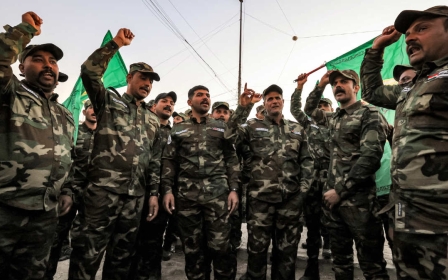Iran commander requested Iraqi armed groups pause attacks on US targets

A visit by the commander of Iran's elite Quds Force to Baghdad, less than 48 hours after three US soldiers were killed in Jordan in January, has led to a halt in attacks on American troops in Iraq, Iranian and Iraqi sources told Reuters.
The sources said the visit marked Tehran's desire to prevent a broader conflict in the region, after Iran-aligned groups ramped up attacks on US targets in Iraq and Syria over Israel's war on Gaza.
Esmail Qaani met representatives of several armed groups in Baghdad airport on 29 January, two days after Washington blamed groups for the attack that killed its soldiers, the sources said.
The strike on Tower 22 in a remote sliver of northeast Jordan sent a shockwave through Washington, as it marked the first public deaths of US soldiers since attacks on US troops began, following the outbreak of the war on Gaza in October.
Qaani told the Iraqi factions that killing Americans risked a heavy US response, Reuters cited 10 of the sources, which include politicians, security officials, diplomats and members of armed groups, as saying.
Stay informed with MEE's newsletters
Sign up to get the latest alerts, insights and analysis, starting with Turkey Unpacked
The Iranian commander said the militias should lie low, to avoid US strikes on their senior commanders, destruction of key infrastructure or even a direct retaliation against Iran, the sources said.
While one faction did not initially agree to Qaani's request, most others did. The next day, Kataeb Hezbollah, the most powerful and active Iranian-backed Shia militia in Iraq, announced it was suspending attacks.
In retaliation for the attack, on 2 February, the US launched strikes on 85 targets in Syria and Iraq that it said were affiliated with Iran and its allies.
A week after Qaani's visit, the US military said it killed a high-ranking commander in Kataeb Hezbollah, Abu Baqir al-Saadi.
The strike came just as US officials had assessed that Iran was looking to rein in its proxies to prevent attacks on US forces that could lead to the outbreak of a wider war.
Since 4 February there have been no attacks on US forces in Iraq and Syria, compared to more than 20 in the two weeks before Qaani's visit.
"Without Qaani's direct intervention, it would have been impossible to convince Kataeb Hezbollah to halt its military operations to de-escalate the tension," a senior commander in one of the Iran-aligned Iraqi armed groups said.
Middle East Eye delivers independent and unrivalled coverage and analysis of the Middle East, North Africa and beyond. To learn more about republishing this content and the associated fees, please fill out this form. More about MEE can be found here.





